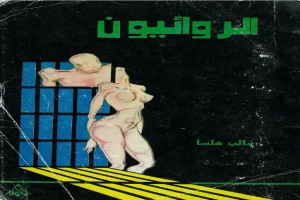Newly released
This book is new and will be uploaded as soon as it becomes available to us and if we secure the necessary publishing rights.

الروائيون
(0)
Author:
Ghalib HelsaNumber Of Reads:
23
Language:
Arabic
Category:
literatureSection:
Pages:
400
Quality:
good
Views:
769
Quate
Review
Save
Share
Book Description
Ghalib Helsa
Jordanian writer. He was born in a village (Ma'in) near (Madaba) in Jordan, on December 18, 1932, and died on the same day in 1989 in Damascus at the age of fifty-seven. Ghalib moved in various Arab countries, from Lebanon, to Egypt, to Iraq, to Syria, in addition to his homeland, Jordan, and had left him at the age of eighteen to Beirut to study at the American University there. But the young man, who had begun trying to write at the age of fourteen, was forced to interrupt his stay in Lebanon and return to his homeland, then to leave again for Baghdad, and then to leave Baghdad for Cairo, where he finished his studies in journalism at the American University. Ghaleb resided in Cairo for twenty-three consecutive years, working in press translation, writing stories and novels, translating literature and criticism, and influencing - with his person, his work and his culture - the generation of novelists, storytellers and poets, who were later called: (the sixties generation). In 1976, Ghaleb Halsa was forced to leave Cairo for Baghdad, which he left after three years for Beirut, where he resided until the Israeli forces invaded the Lebanese capital. The story is that he then traveled with the Palestinian fighters on board one of the ships to Aden, then to Ethiopia and then to Berlin. Finally, he was taken to Damascus, where he resided, until he died seven years after his arrival. The novelist world according to Ghaleb Halsa is one, diverse in its aspects and deep, but specific and frequent in divisions, revolving mainly around the character of the narrator, who sometimes brings us the first person, and sometimes with the third person singular pronoun from which the novelist world emerges. In many cases, the writer's personality appears blatant, with its well-known features from the writer's life. At other times, he takes his name explicitly. Ghaleb is both a writer and a novelist, a loyal son who is able to articulate the era that shook almost all Arab countries, from the late 1940s until the late 1980s: with its hopes, prospects, choices, slogans, promises and aspirations, and then with the crushing blow in 1967 and the collapse that followed. Sensual lust in Ghaleb Halsa’s writings is neither joyful nor joyful, but rather it is not fulfillment, as the writer uses it to express betrayal, failure and fall. During his lifetime, Ghalib published seven novels: The Laughter, 1971. The Khamseen, 1975. The Question, 1979. Weeping over the ruins, 1980. Three Faces of Baghdad, 1984. Najma, 1992 (second edition). Sultana, 1987. The Novelists, 1988. Ghaleb has also published two collections of stories: (Wadih and Saint Milada), 1969 and (Negroes, Bedouins, and Peasants), 1976. This is in addition to what he translated from theoretical works by Gaston Bachelard, and literary works by Salinger, Faulkner and others.
Book Currently Unavailable
This book is currently unavailable for publication. We obtained it under a Creative Commons license, but the author or publisher has not granted permission to publish it.
Rate Now
5 Stars
4 Stars
3 Stars
2 Stars
1 Stars
Quotes
Top Rated
Latest
Quate
Be the first to leave a quote and earn 10 points
instead of 3
Comments
Be the first to leave a comment and earn 5 points
instead of 3